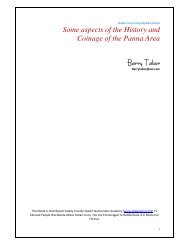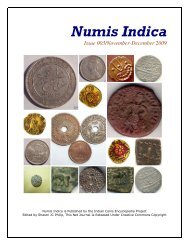- Page 7 and 8:
THE NUMISMATIC CHRONICLE AND JOURNA
- Page 9 and 10:
THE) NUMISMATIC CHRONICLE /// AND J
- Page 11 and 12:
Ciccio (Mons. G. de). CONTENTS. ANC
- Page 13:
PLATES CONTENTS. Ill LIST OF PLATES
- Page 16 and 17:
O J. MAVROGORDATO. with which its m
- Page 18 and 19:
4 J. MAVROGORDATO. contemporaries o
- Page 20 and 21:
6 J MAVROGORDATO. the constancy whi
- Page 22 and 23:
8 J. MAVROGORDATO. Placed as she wa
- Page 24 and 25:
IQ J. MAVROGORDATO. Thessalian town
- Page 26 and 27:
!_> j. MAVROGORDATO. no electrum co
- Page 28 and 29:
14 J. MAVROGORDATO. fall into quite
- Page 30 and 31:
16 J. MAVKOGORDATO. treatise quoted
- Page 32 and 33:
18 J. MAVROGORDATO. erection were r
- Page 34 and 35:
20 J. MAVROGOEDATO. As already sugg
- Page 36 and 37:
22 J. MAVROGORDATO. These two coins
- Page 38 and 39:
24: J. MAVKOGORDATO. solar emblem,
- Page 40 and 41:
26 J- MAVROGORDATO. This type, whic
- Page 42 and 43:
28 J. MAVROGORDATO. onward, and it
- Page 44 and 45: 30 J. MAVROGORDATO. paper, he came
- Page 46 and 47: 32 J. MAVROGOKDATO. 17-00 JR. - mm.
- Page 48 and 49: 34 J. MAVROGORDATO. show its shape
- Page 50 and 51: 36 J. MAVROGORDATO. The chief chara
- Page 52 and 53: 38 J. MAVROGORDATO. the punch-mark
- Page 54 and 55: 40 J. MAVROGORDATO. In field 1. sma
- Page 56 and 57: 42 J. MAVROGORDATO. No. 14. It is n
- Page 58 and 59: 44 J. MAVROGORDATO. Attica, PI. iii
- Page 60 and 61: 4:6 J. MAVROGORDATO. Before leaving
- Page 62 and 63: 48 J. MAVROGORDATO. Not only does t
- Page 64 and 65: 50 J. MAVKOGORDATO. On this ground
- Page 66 and 67: assassin.,!.' Strains. Though this
- Page 68 and 69: 54 E. S. G. ROBINSON. types of grea
- Page 70 and 71: ;,(> E. s. (. KOHIXSON. 7 the B.M.
- Page 72 and 73: 58 E. Sc G. ROBINSON. There is no r
- Page 74 and 75: 60 E. S. G. ROBINSON. A stylistic c
- Page 76 and 77: 62 E. S. G. ROBINSON. to determine
- Page 78 and 79: 64 E. S. G. ROBINSON. such a dating
- Page 80 and 81: , E. S. G. ROBINSON. one to be empl
- Page 82 and 83: 68 E. S. G. KOBINSON. Two early var
- Page 84 and 85: 70 E. S. G. KOBINSON. 18. Obv. Silp
- Page 86 and 87: 72 E. S. G. ROBINSON. 23. Obv. Silp
- Page 88 and 89: 74 E. S. G. ROBINSON. Now No. 28 is
- Page 90 and 91: 7G E. S. G. KOBINSON. which its exp
- Page 92 and 93: 78 E. S. G. KOBINSON. On No. 20, as
- Page 96 and 97: 82 K. s. G. ROBINSON. he had fled t
- Page 98 and 99: 84 E. S. G. ROBIXSOX. What was the
- Page 100 and 101: SI) E. S. G. ROIUXSOX. (Gyrene or B
- Page 102 and 103: 88 E. S. G. ROBINSON. remarkable th
- Page 104 and 105: 90 E. S. G. KOBINSOX. Her. Silphium
- Page 106 and 107: E. S. G. ROBINSON. Rev. Head of bea
- Page 108 and 109: 94 E. S. G. KOBIXSON. of the magist
- Page 110 and 111: 9(> E. S. G. ROBINSON". which may b
- Page 113 and 114: QUAESTIONES CYRENAICAE. 99 pieces,
- Page 115 and 116: QUAESTIONES CYKENAICAE. 101 ethnic,
- Page 117 and 118: (Muller, i. 324), and (3) QUAESTION
- Page 119 and 120: III. SOME IRREGULAR COINAGES OF THE
- Page 121 and 122: n;m
- Page 123 and 124: IRREGULAR COINAGES OF STEPHEN^ TIME
- Page 125 and 126: IRREGULAR COINAGES OF STEPHEN'S TIM
- Page 127 and 128: IKREGULAR COINAGES OP STEPHEN'S TIM
- Page 129 and 130: IRREGULAR COINAGES OF STEPHEN'S TIM
- Page 131 and 132: IRREGULAR COINAGES OF STEPHEN'S TIM
- Page 133 and 134: IRREGULAR COINAGES OF STEPHEN'S TIM
- Page 135 and 136: IV. 345 THE ANCIENT COINS OF LIN-TZ
- Page 137 and 138: THE ANCIENT COINS OF LIN-TZU. 123 a
- Page 139 and 140: THE ANCIENT COINS OF LIN-TZU. 125 t
- Page 141 and 142: | THE ANCIENT COINS OF LIN-TZU. 127
- Page 143 and 144: THE ANCIENT COIHf OP LIN-TZU. 129 F
- Page 145 and 146:
THE ANCIENT COINS OF LIN-TZU. 131 I
- Page 147 and 148:
MISCELLANEA. 133 one. If there was
- Page 149 and 150:
MISCELLANEA. 135 I am indebted to M
- Page 151:
-JrJ r, , * EL NUM. CHRON. SER. IV.
- Page 155:
' ' A a /i NUM. CHRON. SER. IV., VO
- Page 159:
65 NUM. CHRON. SER. IV., VOL. XV. P
- Page 163 and 164:
V. QUAESTIONES CYRENAICAE. (Continu
- Page 165 and 166:
QUAESTIONES CYRENAICAE. 139 an anci
- Page 167 and 168:
QUAESTIONES CYRENAICAE. 141 to abou
- Page 169 and 170:
QUAESTIOXES CYRENAICAE. 14:3 driven
- Page 171 and 172:
QUAESTIONES CYKENAICAE. 145 the sys
- Page 173 and 174:
QUAESTIONES CYKENAICAE. 147 We Lave
- Page 175 and 176:
QUAESTIONES CYRENAICAE. 149 None of
- Page 177 and 178:
QUAESTIONES CYKENAICAE. 151 Of the
- Page 179 and 180:
QUAESTIONES CYKENAICAE. 153 the way
- Page 181 and 182:
QUAESTIONES CYBENAICAE. 155 his suc
- Page 183 and 184:
QUAESTIONES CYKENAICAE. 157 what we
- Page 185 and 186:
QUAESTIONES CYKENAICAE. 159 parison
- Page 187 and 188:
QUAESTIONES CYRENAICAE. 161 should
- Page 189 and 190:
QUAESTIONES CYKENAICAE. 163 This gr
- Page 191 and 192:
QUAESTIONES CYRENAICAE. 165 i. e. a
- Page 193 and 194:
i 78 j I than I the QUAESTIONES CYR
- Page 195 and 196:
QUAESTIONES CYRENAICAE. 169 settlem
- Page 197 and 198:
QUAESTIONES CYRENAICAE. 171 129 of
- Page 199 and 200:
QUAESTIONES CYRENAICAE. 173 reverse
- Page 201 and 202:
QUAESTIONES CYKENAICAE. 175 belong
- Page 203 and 204:
QUAESTIONES CYKENAICAE. 177 82 a. O
- Page 205 and 206:
VI. CBOTON. (SEE PLATE VIII.) 1. TH
- Page 207 and 208:
CROTON. 181 (d) Another specimen. B
- Page 209 and 210:
CROTON. 183 the earliest of the ser
- Page 211 and 212:
CROTON. 185 included with the other
- Page 213 and 214:
CROTON. 187 a Campaiiian legion whi
- Page 215 and 216:
CROTON. 189 seen this coin, thinks
- Page 217 and 218:
CROTON. 191 a manner resembling muc
- Page 219 and 220:
IRISH COINAGES OF HENKY VIII AND ED
- Page 221 and 222:
IEISH COINAGES OF HENRY VIII AND ED
- Page 223 and 224:
IRISH COINAGES OF HENKY VIII AND ED
- Page 225 and 226:
IRISH COINAGES OF HENEY VIII AND ED
- Page 227 and 228:
IRISH COINAGES OF HENRY VIII AND ED
- Page 229 and 230:
IRISH COINAGES OF HENKY VIII AND ED
- Page 231 and 232:
IRISH COINAGES OF HENRY VIII AND ED
- Page 233 and 234:
IRISH COINAGES OF HENRY VIII AND ED
- Page 235 and 236:
IEISH COINAGES OF HENKY VIII AND ED
- Page 237 and 238:
IKISH COINAGES OF HENRY VIII AND ED
- Page 239 and 240:
IRISH COINAGES OF HENEY VIII AND ED
- Page 241 and 242:
IRISH COINAGES OF HENRY VIII AND ED
- Page 243 and 244:
IRISH COINAGES OF HENRY VIII AND ED
- Page 245 and 246:
IKISH COINAGES OF HENKY VIII AND ED
- Page 247 and 248:
IRISH COINAGES OF HENRY VIII AND ED
- Page 249 and 250:
IKISH COINAGES OF HENRY VIII AND ED
- Page 251 and 252:
IRISH COINAGES OF HENRY VIII AND ED
- Page 253 and 254:
IRISH COINAGES OF HENRY VIII AND ED
- Page 255 and 256:
IRISH COINAGES OF HENRY VIII AND ED
- Page 257 and 258:
THE TECHNIQUE OF SIMON VAN DE PASSE
- Page 259 and 260:
THE TECHNIQUE OF SIMON VAN DE PASSE
- Page 261 and 262:
THE TECHNIQUE OF SIMON VAN DE PASSE
- Page 263 and 264:
THE TECHNIQUE OF SIMON VAN DE PASSE
- Page 265 and 266:
THE TECHNIQUE OF SIMON VAN DE PASSE
- Page 267 and 268:
THE TECHNIQUE OF SIMON VAN DE PASSE
- Page 269 and 270:
IX. COINS OF THE SHAHS OF PERSIA. (
- Page 271 and 272:
COINS OF THE SHAHS OF PERSIA. 24:5
- Page 273 and 274:
COINS OF THE SHAHS OF PERSIA. 247 T
- Page 275:
13 10 NUM. CHRON. SER. IV., VOL. XV
- Page 279:
NUM. CHRON. SER. IV., VOL. XV, PL.
- Page 283:
PROCEEDINGS OF THE EOYAL NUMISMATIC
- Page 286 and 287:
4 PROCEEDINGS OF THE 8. Canadian An
- Page 288 and 289:
6 PROCEEDINGS OF THE results of his
- Page 290 and 291:
8 PROCEEDINGS OF THE the 1149 of Ho
- Page 292 and 293:
10 PROCEEDINGS OF THE 3. Journal of
- Page 294 and 295:
12 PROCEEDINGS OF THE APRIL 15, 191
- Page 296 and 297:
PROCEEDINGS OF THE tho important pa
- Page 298 and 299:
16 PROCEEDINGS OF THE JUNE 17, 1915
- Page 300 and 301:
STATEMENT OF RECEIPTS AND DISBURSE-
- Page 302 and 303:
20 PROCEEDINGS OF THE The Reports o
- Page 304 and 305:
22 PROCEEDINGS OF THE In that from
- Page 306 and 307:
24 PROCEEDINGS OF THE worthiness, h
- Page 308 and 309:
26 PKOCEEDINGS OF THE like Mr. Macd
- Page 310 and 311:
28 PROCEEDINGS OF THE Our losses of
- Page 312 and 313:
30 PROCEEDINGS OF THE at the age of
- Page 314 and 315:
32 PKOCEEDINGS OF THE fact that he
- Page 316 and 317:
34: PKOCEEDINGS OF THE Alexander ty
- Page 318 and 319:
36 PROCEEDINGS OF THE of coiffure u
- Page 320 and 321:
38 PKOCEEDINGS OF THE of rubbing a
- Page 322 and 323:
40 PROCEEDINGS OF THE bears the hea
- Page 324 and 325:
42 PKOCEEDINGS OF THE ROYAL NUMISMA
- Page 326 and 327:
250 E. S. G. ROBINSON. and heiress
- Page 328 and 329:
252 E. S. G. KOBINSON. Berenice) wa
- Page 330 and 331:
254 E. S. G. KOBINSOX. third centur
- Page 332 and 333:
256 E. S. G. ROBINSON. 88. 01)v. Si
- Page 334 and 335:
258 E. S. G. ROBINSON. But all thes
- Page 336 and 337:
260 E. S. G. ROBINSON. Ophelias " r
- Page 338 and 339:
262 E. S. G. KOBINSOX. 179, wt. 114
- Page 340 and 341:
264 E. S. G. EOBINSOX. Cydonia that
- Page 342 and 343:
266 E. S. G. KOBINSON. The heads on
- Page 344 and 345:
268 E. S. G. ROBINSON. c. 270, with
- Page 346 and 347:
270 E. S. G. ROBINSON. the reverse
- Page 348 and 349:
272 E. S. G. ROBINSON. 108. Ob v. H
- Page 350 and 351:
274 E. S. G. ROBINSON. The followin
- Page 352 and 353:
276 E. S. G. ROBINSON. tion the few
- Page 354 and 355:
278 E. S. G. ROBIXSOX. have to be a
- Page 356 and 357:
280 E. S. G. ROBINSON. One group of
- Page 358 and 359:
282 E. S. G. ROBINSON. A late date
- Page 360 and 361:
284: E. S. G. ROBINSON. the Cyrenai
- Page 362 and 363:
286 E. S. G. ROBINSON. grandsons of
- Page 364 and 365:
288 E. S. G. ROBINSON. during this
- Page 366 and 367:
290 E. S. G. ROBINSON. of Athens an
- Page 368 and 369:
292 E. S. G. ROBINSON. KOINON coins
- Page 370 and 371:
XI SOME CYPRIOTE "ALEXANDERS". (SEE
- Page 372 and 373:
296 E. T. NEWELL. Cypriote alphabet
- Page 374 and 375:
298 E. T. NEWELL. silver coins, and
- Page 376 and 377:
300 E. T. NEWELL. the name and type
- Page 378 and 379:
302 E. T. NEWELL. 5. TETRADRACHM. O
- Page 380 and 381:
304 E. T. NEWELL. in the monogram "
- Page 382 and 383:
306 E. T. NEWELL. characterized by
- Page 384 and 385:
308 E. T. NEWELL. 7. TETRADRACHM. O
- Page 386 and 387:
310 E. T. NEWELL. 17. TETRADRACHM.
- Page 388 and 389:
312 E. T. NEWELL. 29. TETRADRACHM.
- Page 390 and 391:
314 E. T. NEWELL. may very well hav
- Page 392 and 393:
316 E. T. NEWELL. denominations of
- Page 394 and 395:
318 E. T. NEWELL. 6. TETRADEACHM. O
- Page 396 and 397:
320 E. T. NEWELL. corroborated by o
- Page 398 and 399:
322 SOME CYPKIOTE "ALEXANDERS". It
- Page 400 and 401:
324 FREDK. A. WALTERS. perfectly ci
- Page 402 and 403:
326 FKEDK. A. WALTERS. a laurel wre
- Page 404 and 405:
328 FREDK. A. WALTERS. Augustus, wi
- Page 406 and 407:
330 FREDK. A. WALTERS. details of m
- Page 408 and 409:
332 FREDK. A. WALTERS. to his own s
- Page 410 and 411:
334 FKEDK. A. WALTERS. and legend.
- Page 412 and 413:
XIII HOAED OF NINE ANGLO-SAXON PENN
- Page 414 and 415:
338 R. CYRIL LOCKETT. Although, the
- Page 416 and 417:
840 K. CYRIL LOCKETT. seen that the
- Page 418 and 419:
34:2 K. CYKIL LOCKETT. until his de
- Page 420 and 421:
o 23 fe O PQ P S n 02 I I I I fen 5
- Page 422 and 423:
346 HENRY SYMONDS. Parliament and A
- Page 424 and 425:
348 HENRY SYMONDS. Gold of 22 carat
- Page 426 and 427:
350 HENRY SYMONDS. JAMES II. 14 Jul
- Page 428 and 429:
352 H. L. KABINO. which remained un
- Page 430 and 431:
354 H. L. RABINO. 14. Rasht. Obv. ^
- Page 432 and 433:
356 H. L. KABINO. boar, above bird
- Page 434 and 435:
358 MISCELLANEA. qu'un autre seul e
- Page 436:
360 MISCELLANEA. flottantes par der
- Page 441:
NUM. CHRON. SER. IV., VOL. XV. PL.
- Page 445:
NUM. CHRON. SEP. IV., VOL. XV. PL.
- Page 449 and 450:
XVI. A CHRONOLOGICAL ARRANGEMENT OF
- Page 451 and 452:
CHRONOLOGY OF THE COINS OF CHIOS. 3
- Page 453 and 454:
CHKONOLOGY OF THE COINS OF CHIOS. 3
- Page 455 and 456:
CHKONOLOGY OF THE COINS OP CHIOS. 3
- Page 457 and 458:
CHRONOLOGY OF THE COINS OF CHIOS. 3
- Page 459 and 460:
CHRONOLOGY OF THE COINS OF CHIOS. 3
- Page 461 and 462:
CHRONOLOGY OF THE COINS OF CHIOS. 3
- Page 463 and 464:
CHRONOLOGY OF THE COINS OF CHIOS. 3
- Page 465 and 466:
CHKONOLOGY OF THE COINS OF CHIOS. 3
- Page 467 and 468:
CHRONOLOGY OF THE COINS OF CHIOS. 3
- Page 469 and 470:
" CHRONOLOGY OF THE COINS OF CHIOS.
- Page 471 and 472:
CHRONOLOGY OF THE COINS OF CHIOS. 3
- Page 473 and 474:
CHRONOLOGY OF THE COINS OF CHIOS. 3
- Page 475 and 476:
CHRONOLOGY OF THE COINS OF CHIOS. 8
- Page 477 and 478:
CHKONOLOGY OP THE COINS OF CHIOS. 3
- Page 479 and 480:
CHRONOLOGY OF THE COINS OF CHIOS. 3
- Page 481 and 482:
CHRONOLOGY OF THE COINS OF CHIOS. 3
- Page 483 and 484:
CHRONOLOGY OF THE COINS OF CHIOS. 3
- Page 485 and 486:
_ CHEONOLOGY OP THE COINS OF CHIOS.
- Page 487 and 488:
CHRONOLOGY OF THE COINS OF CHIOS. 3
- Page 489 and 490:
CHRONOLOGY OF THE COINS OF CHIOS. 4
- Page 491 and 492:
CHRONOLOGY OF THE COINS OF CHIOS. 4
- Page 493 and 494:
CHKONOLOGY OF THE COINS OF CHIOS. 4
- Page 495 and 496:
CHRONOLOGY OF THE COINS OF CHIOS. 4
- Page 497 and 498:
CHRONOLOGY OF THE COINS OF CHIOS. 4
- Page 499 and 500:
wL* CHRONOLOGY OF THE COINS OF CHIO
- Page 501 and 502:
CHRONOLOGY OF THE COINS OF CHIOS. 4
- Page 503 and 504:
CHRONOLOGY OF THE COINS OF CHIOS. 4
- Page 505 and 506:
CHRONOLOGY OF THE COINS OF CHIOS. 4
- Page 507 and 508:
CHRONOLOGY OF THE COINS OF CHIOS. 4
- Page 509 and 510:
CHRONOLOGY OF THE COINS OF CHIOS. 4
- Page 511 and 512:
CHKONOLOGY OF THE COINS OF CHIOS. 4
- Page 513 and 514:
CHRONOLOGY OF THE COINS OF CHIOS. 4
- Page 515 and 516:
CHRONOLOGY OF THE COINS OF CHIOS. 4
- Page 517 and 518:
CHRONOLOGY OF THE COINS OF CHIOS. 4
- Page 519 and 520:
HH jx> 10 X Q 5 W r^OO g^ =o d, S A
- Page 521 and 522:
XVII. NOTES ON THE COINAGE AND SILV
- Page 523 and 524:
COINAGE AND CUERENCY IN ROMAN BRITA
- Page 525 and 526:
COINAGE AND CURRENCY IN ROMAN BRITA
- Page 527 and 528:
COINAGE AND CURRENCY IN ROMAN BRITA
- Page 529 and 530:
COINAGE AND CURRENCY IN ROMAN BRITA
- Page 531 and 532:
COINAGE AND CURRENCY IN ROMAN BRITA
- Page 533 and 534:
COINAGE AND CURRENCY IN ROMAN BRITA
- Page 535 and 536:
COINAGE AND CURRENCY IN ROMAN BRITA
- Page 537 and 538:
COINAGE AND CURRENCY IN ROMAN BRITA
- Page 539 and 540:
COINAGE AND CUKRENCY IN ROMAN BRITA
- Page 541 and 542:
COINAGE AND CURRENCY IN ROMAN BRITA
- Page 543 and 544:
COINAGE AND CURRENCY IN ROMAN BRITA
- Page 545 and 546:
COINAGE AND CURRENCY IN ROMAN BRITA
- Page 547 and 548:
COINAGE AND CURRENCY IN ROMAN BRITA
- Page 549 and 550:
COINAGE AND CURRENCY IN ROMAN BRITA
- Page 551 and 552:
COINAGE AND CURRENCY IN ROMAN BRITA
- Page 553 and 554:
COINAGE AND CURRENCY IN ROMAN BRITA
- Page 555 and 556:
COINAGE AND CUKRENCY IN ROMAN BRITA
- Page 557 and 558:
COINAGE AND CURRENCY IN ROMAN BRITA
- Page 559 and 560:
COINAGE AND CURRENCY IN ROMAN BRITA
- Page 561 and 562:
COINAGE AND CURRENCY IN ROMAN BRITA
- Page 563 and 564:
COINAGE AND CUERENCY IN ROMAN BRITA
- Page 565 and 566:
COINAGE AND CURRENCY IN ROMAN BRITA
- Page 567 and 568:
COINAGE AND CURRENCY IN ROMAN BRITA
- Page 569 and 570:
COINAGE AND CURRENCY IN ROMAN BRITA
- Page 571 and 572:
COINAGE AND CURRENCY IN ROMAN BRITA
- Page 573 and 574:
COINAGE AND CURRENCY IN ROMAN BRITA
- Page 575 and 576:
COINAGE AND CURRENCY IN ROMAN BRITA
- Page 577 and 578:
85 COINAGE AND CURRENCY IN ROMAN BR
- Page 579 and 580:
COINAGE AND CURRENCY IN ROMAN BRITA
- Page 581 and 582:
COINAGE AND CURRENCY IN ROMAN BRITA
- Page 583 and 584:
COINAGE AND CURRENCY IN ROMAN BRITA
- Page 585 and 586:
COINAGE AND CURRENCY IN ROMAN BRITA
- Page 587 and 588:
COINAGE AND CURRENCY IN ROMAN BRITA
- Page 589 and 590:
COINAGE AND CUKRENCY IN ROMAN BRITA
- Page 591 and 592:
COINAGE AND CURRENCY IN ROMAN BRITA
- Page 593 and 594:
COINAGE AND CUKKENCY IN ROMAN BRITA
- Page 595 and 596:
COINAGE AND CURRENCY IN ROMAN BRITA
- Page 597 and 598:
COINAGE AND CURRENCY IN ROMAN BRITA
- Page 599 and 600:
COINAGE AND cURKKNcy IN UOMAN BRITA
- Page 601 and 602:
COINAGE AND CURRENCY IN ROMAN BRITA
- Page 603 and 604:
COINAGE AND CURRENCY IN ROMAN BRITA
- Page 605 and 606:
COINAGE AND CUKRENCY IN ROMAN BRITA
- Page 607 and 608:
COINAGE AND CURRENCY IN ROMAN BRITA
- Page 609 and 610:
Aemilius (M.) Lepidus, coin of, 520
- Page 611 and 612:
Karpathos, Gyrene coin attributed t
- Page 613:
NUM. CHRON. SEP. IV., VOL. XV. PL.
- Page 617:
10 13 is ^^33 ftt* NUM. CHRON. SER.
- Page 621 and 622:
PATRON HIS MAJESTY THE KING LIST OF
- Page 623 and 624:
ELECTED LIST OF FELLOWS. 5 1914CAME
- Page 625 and 626:
ELECTED LIST OF FELLOWS. 7 1871 GAR
- Page 627 and 628:
ELECTED LIST OF FELLOWS. 9 1901 KOZ
- Page 629 and 630:
ELECTED LIST OF FELLOWS. 11 1898 OG
- Page 631 and 632:
LIST OF FELLOWS. 13 ELECTED 1914 *S
- Page 633 and 634:
15 HONORARY FELLOWS 1898 His MAJEST
- Page 639:
CJ i N6 ser.4 v.15 3EPT. MAR 1 1958

















